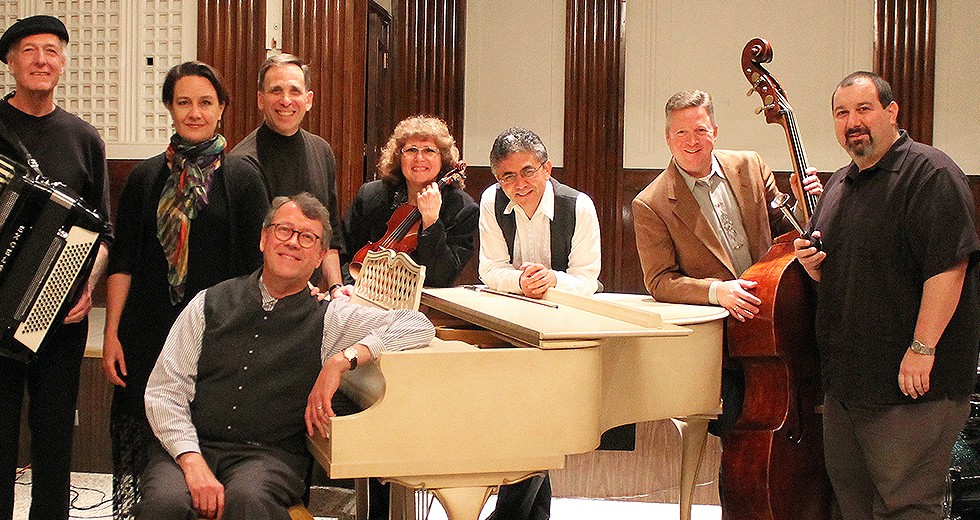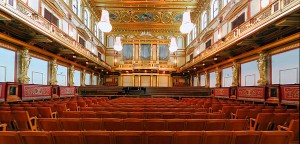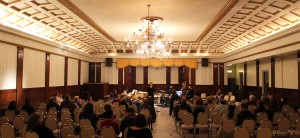
The rectangular hall is a gilded jewel box from a forgotten era, but bereft of sparkle.
Swirling cornices are faded gold, the oak wainscoting chipped. The musty ceiling seems like a slice of wedding cake kept from nuptials long past.
Straight rows face the raised stage. Herr Bohlman enters from a side door and slips past the players.
The music begins, but the strings feel sharp and harsh. ItŌĆÖs a familiar melody ŌĆö strains of Wiener Blut,┬Āor Viennese Blood, by Johann Strauss Jr. (1825-1899), the waltz king who certainly had it. But Bohlman, more spieler than singer, sneers a strange, unsettling lyric.
Wiener Duft, Wiener Duft,
Ja, das liegt halt bei uns in der Luft
Fifth in a series: Exploring ties between the CSOŌĆÖs hometown and cities on its 2014 European tour
Tonight in ChicagoŌĆÖs Lincoln Square, at the fittingly named DANK Haus cultural center, the smells and odors of Vienna really do seem to hang in the air ŌĆö just as Leo Strauss parodies in Aus der Familie der Str├żusse,┬Āor From the Strauss Family,┬Āa resigned Theresienstadt memory from a composer with a different type of Viennese blood. This latter Strauss (1897-1944) reflects from his concentration camp in three-quarter time (here translated into English):

The Goldener Saal inside ViennaŌĆÖs Musikverein, where the Chicago Symphony Orchestra is performing on tour.
There are so many composers,
All of them with the name, Strauss
Some of them are Jews, some Christians,
All with the same name, Strauss
ViennaŌĆÖs famed Musikverein ŌĆö the CSOŌĆÖs final stop on its 2014 European tour ┬ĀŌĆö evokes a romantic, imperial, almost imagined sense of nostalgia. If concerts in its vibrant, polished Goldener Saal recall AustriaŌĆÖs 19th-century musical triumphs, this tough little shoebox on ChicagoŌĆÖs North Side confronts the darker challenges of ViennaŌĆÖs 20th century.
New Budapest Orpheum Society, the rough court musicians at the DANK Haus saal this evening, dedicates itself to an overlooked legacy: what Philip Bohlman, the ensembleŌĆÖs artistic director, proudly calls ŌĆ£Jewish cabaret.ŌĆØ
Anything Herr Professor Bohlman finesses in singing he more than returns in scholarship, as he scours ViennaŌĆÖs libraries for censored songs and satires. Bohlman, an ethnomusicologist and Mary Werkman Distinguished Service Professor in the University of ChicagoŌĆÖs Department of Music, heads New Budapest Orpheum, a crack squad of eight local singers and musicians who share his commitment and vision.

New Budapest Orpheum SocietyŌĆÖs Julia Bentley performs at DANK Haus, in Chicago’s Lincoln Square, which recalls the Goldener Saal in Vienna’s Musikverein.
The original Budapester Orpheum Gesellschaft, a loose-knit cabaret ensemble that faded with the Hapsburg Empire in World War I, was Viennese, not Hungarian. The eastern exoticism of the next town over, a mere 150 miles down the Danube, fascinated the cadre of Jewish composers and parodists who made Vienna their professional home.
ŌĆ£Nothing from Vienna is from Vienna. This is something you have to understand,ŌĆØ explains Bohlman, speaking of goulash, the meaty Hungarian staple, but stews can be musical, too. ŌĆ£What Vienna seems to be, itŌĆÖs not really Vienna. It comes from elsewhere. And it comes together in Vienna, and thatŌĆÖs why itŌĆÖs the great city of cabaret.ŌĆØ
In the 1920s, a Jewish Budapester who had made his way to Vienna, composer Emmerich K├Īlm├Īn (1882-1953), spied ŌĆ£elsewhereŌĆØ nearly 5,000 miles away, in an exotic town he had yet to visit ŌĆö Chicago.
K├Īlm├Īn ŌĆ£was really interested in the whole question of minority, what we would call today ŌĆśmulti-culturalism,ŌĆÖŌĆØ Bohlman says, and the bustling city that the composer imagines in his 1928 operetta Die Herzogin von Chicago, or The Duchess of Chicago, is far from the bleak sobriety of DANK Haus, in a building finished the year before.
New Budapest OrpheumŌĆÖs Julia Bentley sweeps to the floor for ŌĆ£Wir Ladies aus Amerika,ŌĆØ┬ĀK├Īlm├ĪnŌĆÖs comical Teutonic take on what Chicago women want. If the mezzoŌĆÖs festive German were to roll off in English:
We ladies from America
Now and again attract lovers!
We also dream of love and fortune,
Inflamed by sweet drinks and music!
We glow as hot as fire with jazz and saxophone
And dream to the banjoŌĆÖs sweet sound
This was the era of Louis Armstrong (1901-1971), his Hot Five and Hot Seven recordings in Chicago. ŌĆ£Chicago was known as the place were jazz was happening by the late 1920s,ŌĆØ Bohlman recounts, ŌĆ£and Chicago is playing an incredible role here ŌĆö and [K├Īlm├Īn] puts it together here in an entirely new sound. And thatŌĆÖs whatŌĆÖs important about [The Duchess of Chicago] is that itŌĆÖs really a collection of jazz pieces that then are sort of fitted into this mold of a Viennese operetta style, which entirely accommodates it.ŌĆØ
The so-called Silver Age of Viennese operetta ŌĆö the gold medal goes to the prior generationŌĆÖs Johanns and Strausses ŌĆö pushes another decade past 1928. New Budapest Orpheum explores this era before the 1938 Anschluss, when Nazi Germany annexed Austria, and Jewish cabaretŌĆÖs diaspora, in the new recording ŌĆ£As Dreams Fall Apart: The Golden Age of Jewish Stage and Film Music 1925-1955.ŌĆØ┬Ā
ŌĆ£As Dreams Fall ApartŌĆØ isnŌĆÖt limited to Vienna or even Europe ŌĆö at DANK Haus I canŌĆÖt stifle a cough during the first part of ŌĆ£Erlekh Zayn,ŌĆØ┬Āor ŌĆ£Be Virtuous,ŌĆØ a Second Avenue Yiddish ditty by Boris Thomashefsky (1866-1939); still the band plays on. (CSO audiences learned last November that ThomashefskyŌĆÖs grandson, the patronym- and lozenge-tossing conductor Michael, is less forgiving.) But the fortunes of Viennese composers like K├Īlm├Īn and Erich Korngold (1897-1957), who both reached the United States, plus a host of less familiar names, remain central to New Budapest OrpheumŌĆÖs work.
After 1938, few Jewish artists steeped in cabaret fared as well as K├Īlm├Īn and Korngold. Bohlman knows, his German intoning tonightŌĆÖs epitaph ŌĆö the final verses of Leo StraussŌĆÖ futile hopes from Theresienstadt (translated):
Though theyŌĆÖve driven me
Away from my home,
To me, Vienna remains
A bouquet of flowers still today
Just one last visit,
Before itŌĆÖs all gone,
Just one last time to see Vienna,
Just once in May
In ViennaŌĆÖs Golden Age, Strauss songs finish with champagne and celebration. New Budapest Orpheum is ChicagoŌĆÖs stinging reminder that Strauss songs from ViennaŌĆÖs Silver Age end at Auschwitz.
Andrew Huckman is a Chicago-based lawyer and writer.┬Ā
TOP: Philip Bohlman, at the piano, is joined by members of New Budapest Orpheum Society.